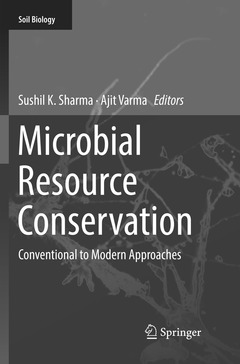Microbial Resource Conservation, 1st ed. 2018 Conventional to Modern Approaches Soil Biology Series, Vol. 54
Coordonnateurs : Sharma Sushil K., Varma Ajit

1. Microbial Genetic Resources: Status, Conservation, Access and Benefit Sharing (ABS) Regulations.- 2. Concept of Microbial Preservation: Past, Present and Future.- 3. Establishment and Management of Culture Collections of Microorganisms (mBRC): An Overview.- 4. Specialized Microbial Resource Centres: A Driving Force of the Growing Bioeconomy.- 5. Agricultural Microbial Genetic Resources: Application and Preservation at Microbial Resource Centres (mBRCs).- 6. Rhizobia: Culture Collections, Identification and Methods of Preservation.- 7. Biobank for Conservation of Arbuscular Mycorrhizal (AM) Fungi.- 8. Conservation of Fungi: A Review on Conventional Approaches.- 9. Veterinary Type Cultures and their Preservation: Status and Challenges.- 10. Biodiversity Conservation of Phages and Microbial Populations.- 11. Modern Immunochemical Approaches in Microbiology.- 12. Conservation and Application of Microalgae for Biofuel Production.- 13. Desert Truffles in Saudi Arabia: Diversity, Ecology, and Conservation.- 14. Maintenance, Conservation and Regulation of Microbial Resources for Defense Applications.- 15. Diversity, Ecology and Conservation of Fungal and Bacterial Endophytes.- 16. Archaea: Ecology, Application and Conservation.
Provides latest information on conventional and modern methods of preservation of diverse microbes
Attracts readers from pharma, agriculture, biotechnology, and industry as conservation of microbial resources is increasingly important for their utilization
Is a source of knowledge in conventional methodologies for conservation
Numerous illustrations make this book a valuable read
Date de parution : 01-2019
Ouvrage de 451 p.
15.5x23.5 cm
Date de parution : 11-2018
Ouvrage de 451 p.
15.5x23.5 cm
Thèmes de Microbial Resource Conservation :
Ces ouvrages sont susceptibles de vous intéresser

Laboratory Practices in Microbiology 145,45 €


